Paper Menu >>
Journal Menu >>
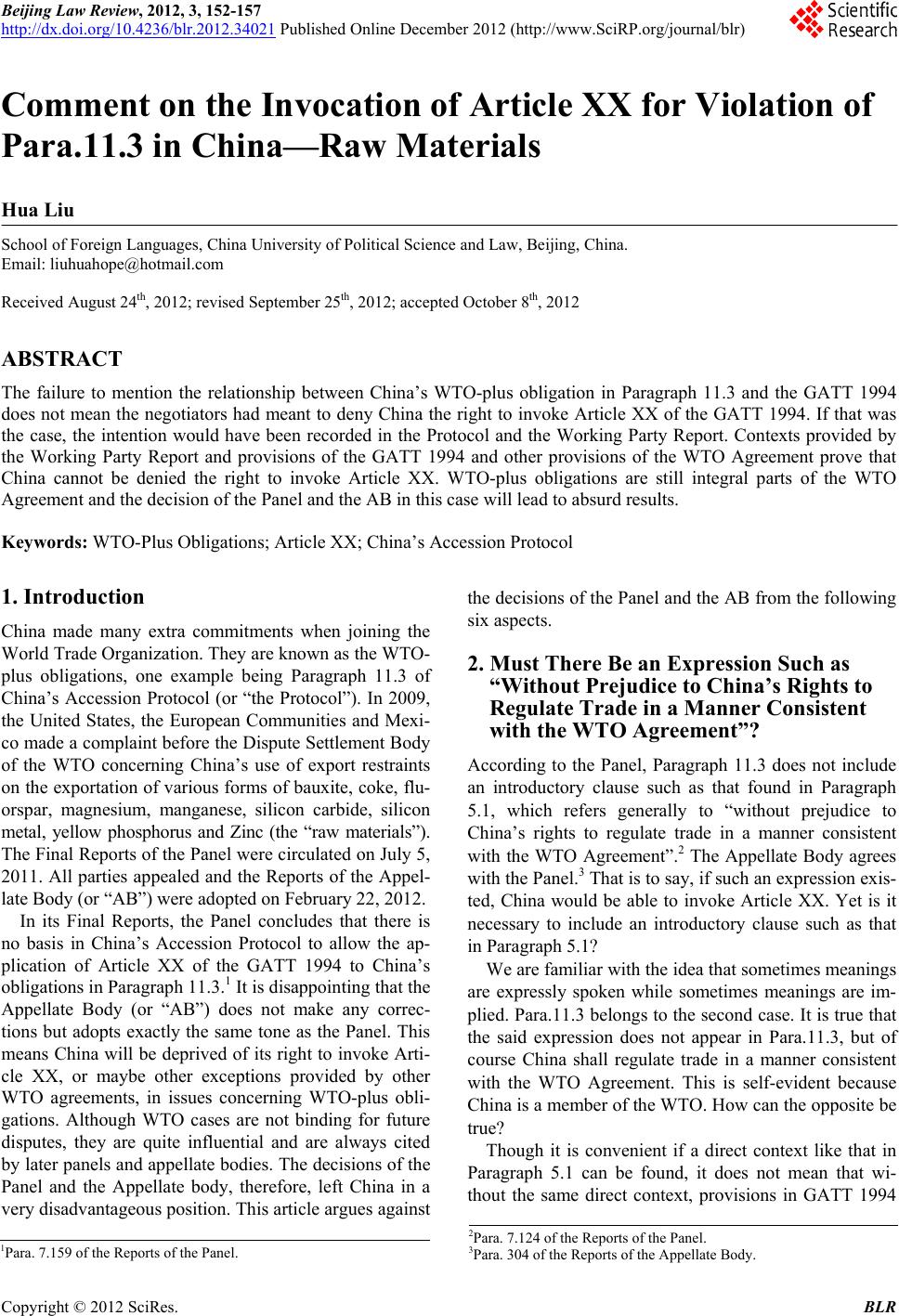 Beijing Law Review, 2012, 3, 152-157 http://dx.doi.org/10.4236/blr.2012.34021 Published Online December 2012 (http://www.SciRP.org/journal/blr) Comment on the Invocation of Article XX for Violation of Para.11.3 in China—Raw Materials Hua Liu School of Foreign Languages, China University of Political Science and Law, Beijing, China. Email: liuhuahope@hotmail.com Received August 24th, 2012; revised September 25th, 2012; accepted October 8th, 2012 ABSTRACT The failure to mention the relationship between China’s WTO-plus obligation in Paragraph 11.3 and the GATT 1994 does not mean the negotiators had meant to deny China the right to invoke Article XX of the GATT 1994. If that was the case, the intention would have been recorded in the Protocol and the Working Party Report. Contexts provided by the Working Party Report and provisions of the GATT 1994 and other provisions of the WTO Agreement prove that China cannot be denied the right to invoke Article XX. WTO-plus obligations are still integral parts of the WTO Agreement and the decision of the Panel and the AB in this case will lead to absurd results. Keywords: WTO-Plus Obligations; Article XX; China’s Accession Protocol 1. Introduction China made many extra commitments when joining the World Trade Organization. They are known as the WTO - plus obligations, one example being Paragraph 11.3 of China’s Accession Protocol (or “the Protocol”). In 2009, the United States, the European Communities and Mexi- co made a complaint before the Dispute Settlement Body of the WTO concerning China’s use of export restraints on the exportation of various forms of bauxite, coke, flu- orspar, magnesium, manganese, silicon carbide, silicon metal, yellow phosphorus and Zinc (the “raw materials”). The Final Reports of the Panel wer e circulated on July 5, 2011. All parties appealed and the Reports of the Appel- late Body (or “AB”) were adopted on February 22, 2012. In its Final Reports, the Panel concludes that there is no basis in China’s Accession Protocol to allow the ap- plication of Article XX of the GATT 1994 to China’s obligations in Paragrap h 11 .3.1 It is disappo intin g th at the Appellate Body (or “AB”) does not make any correc- tions but adopts exactly the same tone as the Panel. This means China will be deprived of its right to invoke Arti- cle XX, or maybe other exceptions provided by other WTO agreements, in issues concerning WTO-plus obli- gations. Although WTO cases are not binding for future disputes, they are quite influential and are always cited by later panels and appellate bodies. The decisions of the Panel and the Appellate body, therefore, left China in a very disadvantageous position. This article argues against the decisions of the Panel and the AB from the following six aspects. 2. Must There Be an Expression Such as “Without Prejudice to China’s Rig hts to Regulate Trade in a Manner Consistent with the WTO Agreement”? According to the Panel, Paragraph 11.3 does not include an introductory clause such as that found in Paragraph 5.1, which refers generally to “without prejudice to China’s rights to regulate trade in a manner consistent with the WTO Agreement”.2 The Appellate Body agrees with the Panel.3 That is to say, if such an expression exis- ted, China would be able to invoke Article XX. Yet is it necessary to include an introductory clause such as that in Paragraph 5.1? We are familiar with the idea that sometimes meanings are expressly spoken while sometimes meanings are im- plied. Para.11.3 belongs to the second case. It is true that the said expression does not appear in Para.11.3, but of course China shall regulate trade in a manner consistent with the WTO Agreement. This is self-evident because China is a member of the WTO. How can the opposite be true? Though it is convenient if a direct context like that in Paragraph 5.1 can be found, it does not mean that wi- thout the same direct context, provisions in GATT 1994 2Para. 7.124 of the Reports of the Panel. 3Para. 304 of the Reports of the Appellate Body. 1Para. 7.159 of the Reports of the Panel. Copyright © 2012 SciRes. BLR 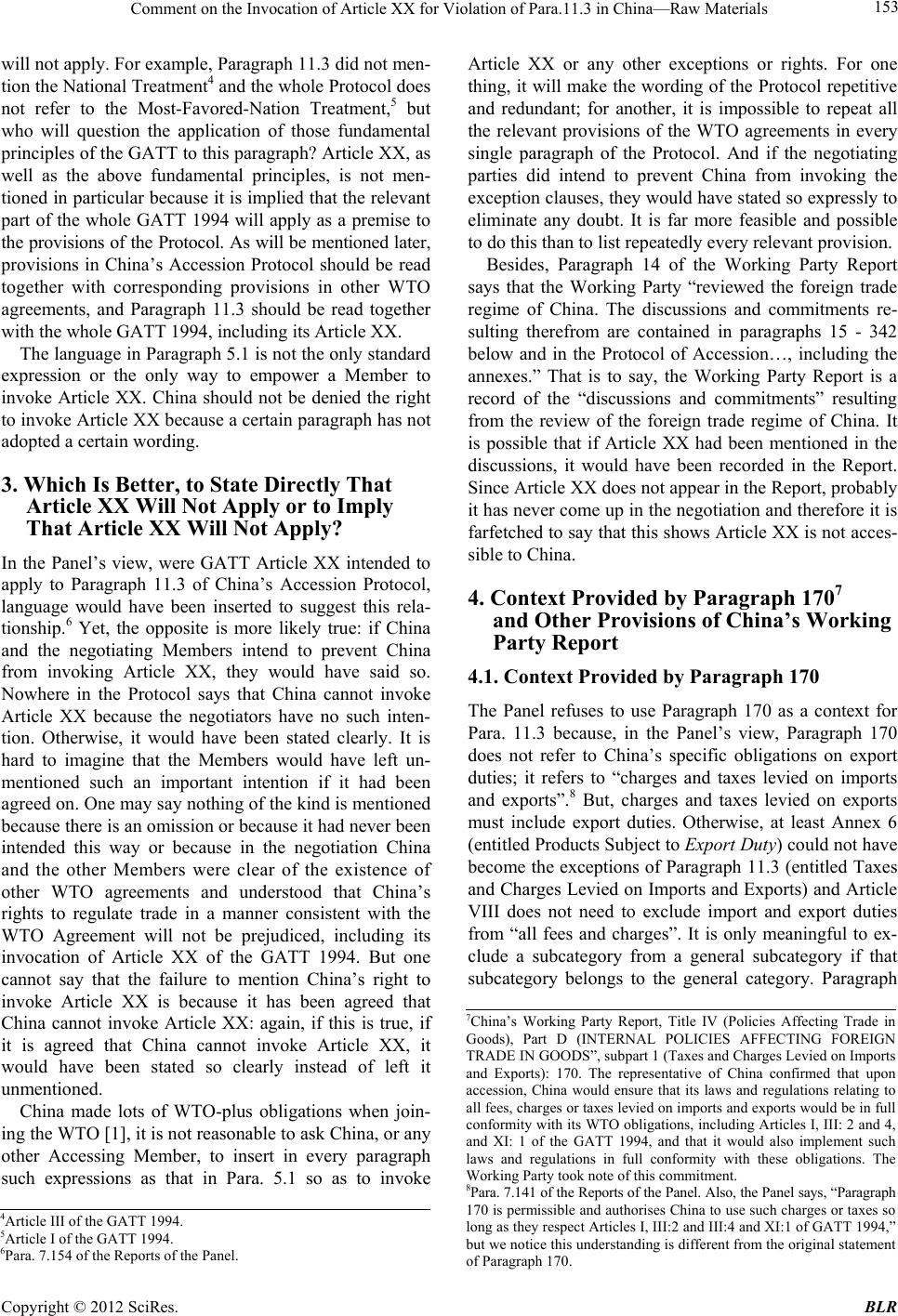 Comment on the Invocation of Article XX for Violation of Para.11.3 in China—Raw Materials 153 will not apply. For example, Paragraph 11.3 did no t men- tion the National Treatment4 and the whole Protocol does not refer to the Most-Favored-Nation Treatment,5 but who will question the application of those fundamental principles of the GATT to this paragraph? Article XX, as well as the above fundamental principles, is not men- tioned in particular because it is implied that the relevant part of the whole GATT 1994 will apply as a premise to the provisions of the Protocol. As will be mentioned later, provisions in China’s Accession Protocol should be read together with corresponding provisions in other WTO agreements, and Paragraph 11.3 should be read together with the whole GATT 1994, including its Article XX. The language in Paragraph 5.1 is not the only standard expression or the only way to empower a Member to invoke Article XX. China should not be denied the right to invoke Article XX becau se a certain paragr aph has not adopted a certain wording. 3. Which Is Better, to State Directly That Article XX Will Not Apply or to Imply That Article XX Will Not Apply? In the Panel’s view, were GATT Article XX intended to apply to Paragraph 11.3 of China’s Accession Protocol, language would have been inserted to suggest this rela- tionship.6 Yet, the opposite is more likely true: if China and the negotiating Members intend to prevent China from invoking Article XX, they would have said so. Nowhere in the Protocol says that China cannot invoke Article XX because the negotiators have no such inten- tion. Otherwise, it would have been stated clearly. It is hard to imagine that the Members would have left un- mentioned such an important intention if it had been agreed on. One may say nothing of the kind is mentioned because there is an omission or because it had never been intended this way or because in the negotiation China and the other Members were clear of the existence of other WTO agreements and understood that China’s rights to regulate trade in a manner consistent with the WTO Agreement will not be prejudiced, including its invocation of Article XX of the GATT 1994. But one cannot say that the failure to mention China’s right to invoke Article XX is because it has been agreed that China cannot invoke Article XX: again, if this is true, if it is agreed that China cannot invoke Article XX, it would have been stated so clearly instead of left it unmentioned. China made lots of WTO-plus obligations when join- ing the WTO [1], it is not reaso nable to ask China, or any other Accessing Member, to insert in every paragraph such expressions as that in Para. 5.1 so as to invoke Article XX or any other exceptions or rights. For one thing, it will make the wording of the Protocol repetitive and redundant; for another, it is impossible to repeat all the relevant provisions of the WTO agreements in every single paragraph of the Protocol. And if the negotiating parties did intend to prevent China from invoking the exception clauses, they would have stated so expressly to eliminate any doubt. It is far more feasible and possible to do this than to list repeatedly every relevant provision. Besides, Paragraph 14 of the Working Party Report says that the Working Party “reviewed the foreign trade regime of China. The discussions and commitments re- sulting therefrom are contained in paragraphs 15 - 342 below and in the Protocol of Accession…, including the annexes.” That is to say, the Working Party Report is a record of the “discussions and commitments” resulting from the review of the foreign trade regime of China. It is possible that if Article XX had been mentioned in the discussions, it would have been recorded in the Report. Since Article XX does not appear in the Report, probably it has never come up in the negotiation and therefore it is farfetched to say that this shows Article XX is not acces- sible to China. 4. Context Provided by Paragraph 1707 and Other Provisions of China’s Working Party Report 4.1. Context Provided by Paragraph 170 The Panel refuses to use Paragraph 170 as a context for Para. 11.3 because, in the Panel’s view, Paragraph 170 does not refer to China’s specific obligations on export duties; it refers to “charges and taxes levied on imports and exports”.8 But, charges and taxes levied on exports must include export duties. Otherwise, at least Annex 6 (entitled Products Subject to Export Duty) could not have become the exceptions of Paragraph 11.3 (entitled Taxes and Charges Levied on Imports and Exports) and Article VIII does not need to exclude import and export duties from “all fees and charges”. It is only meaningful to ex- clude a subcategory from a general subcategory if that subcategory belongs to the general category. Paragraph 7China’s Working Party Report, Title IV (Policies Affecting Trade in Goods), Part D (INTERNAL POLICIES AFFECTING FOREIGN TRADE IN GOODS”, subpart 1 (Taxes and Charges Levied on Imports and Exports): 170. The representative of China confirmed that upon accession, China would ensure that its laws and regulations relating to all fees, charges or taxes levied on imports and exports would be in full conformity with its WTO obligations, including Articles I, III: 2 and 4, and XI: 1 of the GATT 1994, and that it would also implement such laws and regulations in full conformity with these obligations. The Working Party took note of this commitment. 8Para. 7.141 of the Reports of the Panel. Also, the Panel says, “Paragraph 170 is permissible and authorises China to use such charges or taxes so long as they respect Articles I, III:2 and III:4 and XI:1 of GATT 1994,” but we notice this understanding is different from the original statement of Paragraph 170. 4Article III of the GATT 1994. 5Article I of the GATT 1994. 6Para. 7.154 of the Re p orts of the Panel. Copyright © 2012 SciRes. BLR 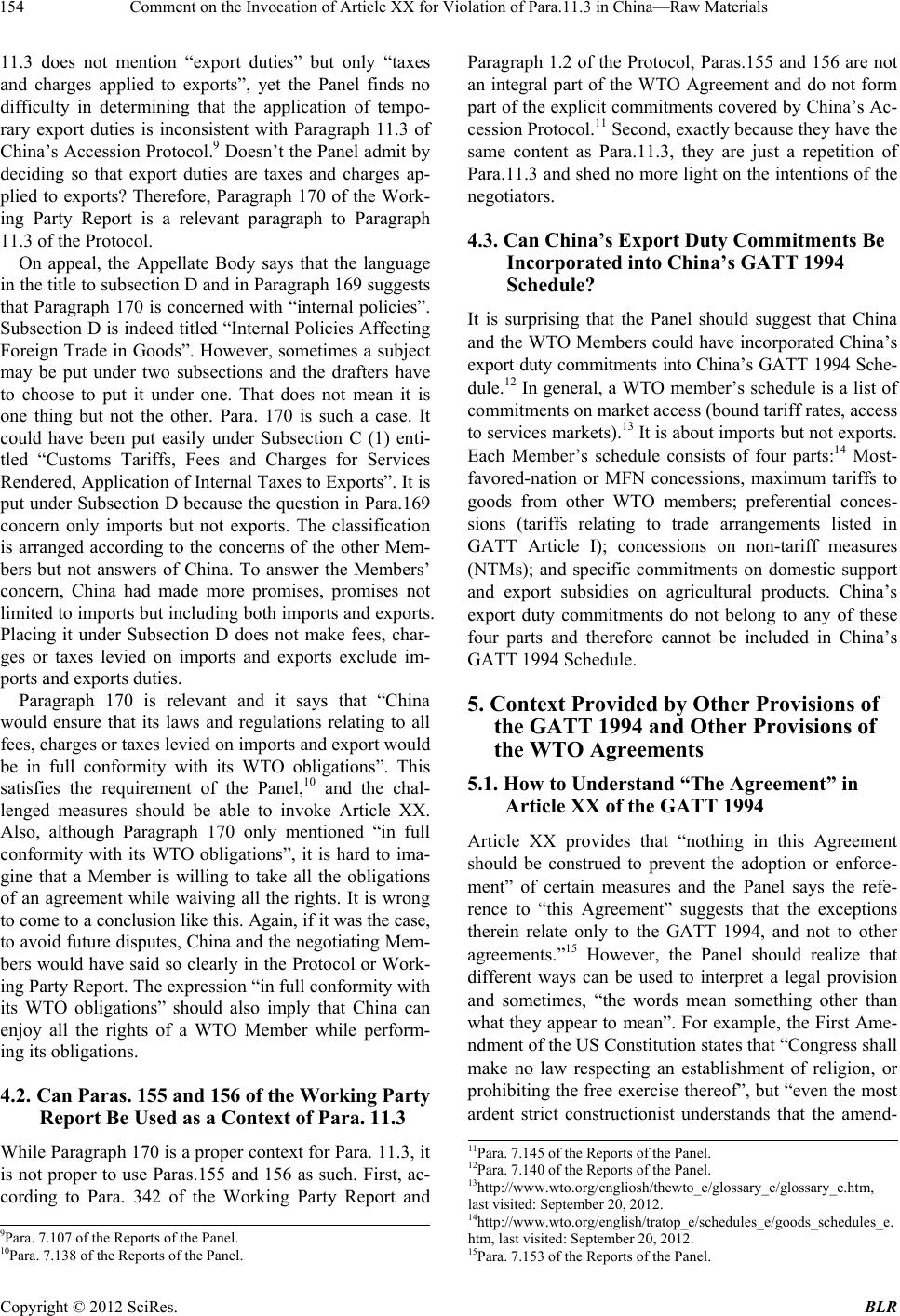 Comment on the Invocation of Article XX for Violation of Para.11.3 in China—Raw Materials 154 11.3 does not mention “export duties” but only “taxes and charges applied to exports”, yet the Panel finds no difficulty in determining that the application of tempo- rary export duties is inconsistent with Paragraph 11.3 of China’s Accession Protocol.9 Doesn’t the Panel admit by deciding so that export duties are taxes and charges ap- plied to exports? Therefore, Paragraph 170 of the Work- ing Party Report is a relevant paragraph to Paragraph 11.3 of the Protocol. On appeal, the Appellate Body says that the language in the title to subsection D and in Paragraph 169 suggests that Paragraph 170 is concerned with “internal policies”. Subsection D is indeed titled “Internal Po licies Affecting Foreign Trade in Goods”. However, sometimes a subject may be put under two subsections and the drafters have to choose to put it under one. That does not mean it is one thing but not the other. Para. 170 is such a case. It could have been put easily under Subsection C (1) enti- tled “Customs Tariffs, Fees and Charges for Services Rendered, Application of Internal Taxes to Exports”. It is put under Subsection D because the question in Para.169 concern only imports but not exports. The classification is arranged according to the concerns of the other Mem- bers but not answers of China. To answer the Members’ concern, China had made more promises, promises not limited to imports but in cluding both impor ts and exports. Placing it under Subsection D does not make fees, char- ges or taxes levied on imports and exports exclude im- ports and exports duties. Paragraph 170 is relevant and it says that “China would ensure that its laws and regulations relating to all fees, charges or taxes levied on imports and export would be in full conformity with its WTO obligations”. This satisfies the requirement of the Panel,10 and the chal- lenged measures should be able to invoke Article XX. Also, although Paragraph 170 only mentioned “in full conformity with its WTO obligations”, it is hard to ima- gine that a Member is willing to take all the obligations of an agreement while waiving all the rights. It is wrong to co me to a co nclusion like th is. Aga in, if i t was the ca se, to avoid future disputes, China and the negotiating Mem- bers would have said so clearly in the Protocol or Work- ing Party Report. The expression “in full conformity with its WTO obligations” should also imply that China can enjoy all the rights of a WTO Member while perform- ing its obligations. 4.2. Can Paras. 155 and 1 56 of the Wo rking Pa rty Report Be Used as a Context of Para. 11.3 While Paragraph 170 is a proper context for Para. 11.3, it is not proper to use Paras.155 and 156 as such. First, ac- cording to Para. 342 of the Working Party Report and Paragraph 1.2 of the Protocol, Paras.155 and 156 are not an integral part of the WTO Agreement and do not form part of the explicit commitmen ts covered by China’s Ac- cession Protocol.11 Second, exactly because they have the same content as Para.11.3, they are just a repetition of Para.11.3 and shed no more light on the intentions of the negotiators. 4.3. Can China’s Export Duty Commitments Be Incorporated into China’s GATT 1994 Schedule? It is surprising that the Panel should suggest that China and the WTO Members could have incorporated China’s export duty commitments into China’s GATT 1994 Sche- dule.12 In general, a WTO member’s schedule is a list of commitments on market access (bound tariff rates, access to services markets).13 It is about imports but not ex ports. Each Member’s schedule consists of four parts:14 Most- favored-nation or MFN concessions, maximum tariffs to goods from other WTO members; preferential conces- sions (tariffs relating to trade arrangements listed in GATT Article I); concessions on non-tariff measures (NTMs); and specific commitments on domestic support and export subsidies on agricultural products. China’s export duty commitments do not belong to any of these four parts and therefore cannot be included in China’s GATT 1994 Schedule. 5. Context Provided by Other Provisions of the GATT 1994 and Other Provisions of the WTO Agreements 5.1. How to Understand “The Agreement” in Article XX of the GATT 1994 Article XX provides that “nothing in this Agreement should be construed to prevent the adoption or enforce- ment” of certain measures and the Panel says the refe- rence to “this Agreement” suggests that the exceptions therein relate only to the GATT 1994, and not to other agreements.”15 However, the Panel should realize that different ways can be used to interpret a legal provision and sometimes, “the words mean something other than what they appear to mean”. For example, the First Ame- ndment of the US Constitution states that “Congress shall make no law respecting an establishment of religion, or prohibiting the free exercise thereof”, but “even the most ardent strict constructionist understands that the amend- 11Para. 7.145 of the Reports of the Panel. 12Para. 7.140 of the Reports of the Panel. 13http://www.wto.org/engliosh/thewto_e/glossary_e/glossary_e.htm, last visited: September 20, 2012. 14http://www.wto.org/english/tratop_e/schedules_e/goods_schedules_e. htm, last visited: September 20, 2012. 15Para. 7.153 of the Reports of the Panel. 9Para. 7.107 of the Reports of the Panel. 10Para. 7.138 of the Reports of the Panel. Copyright © 2012 SciRes. BLR 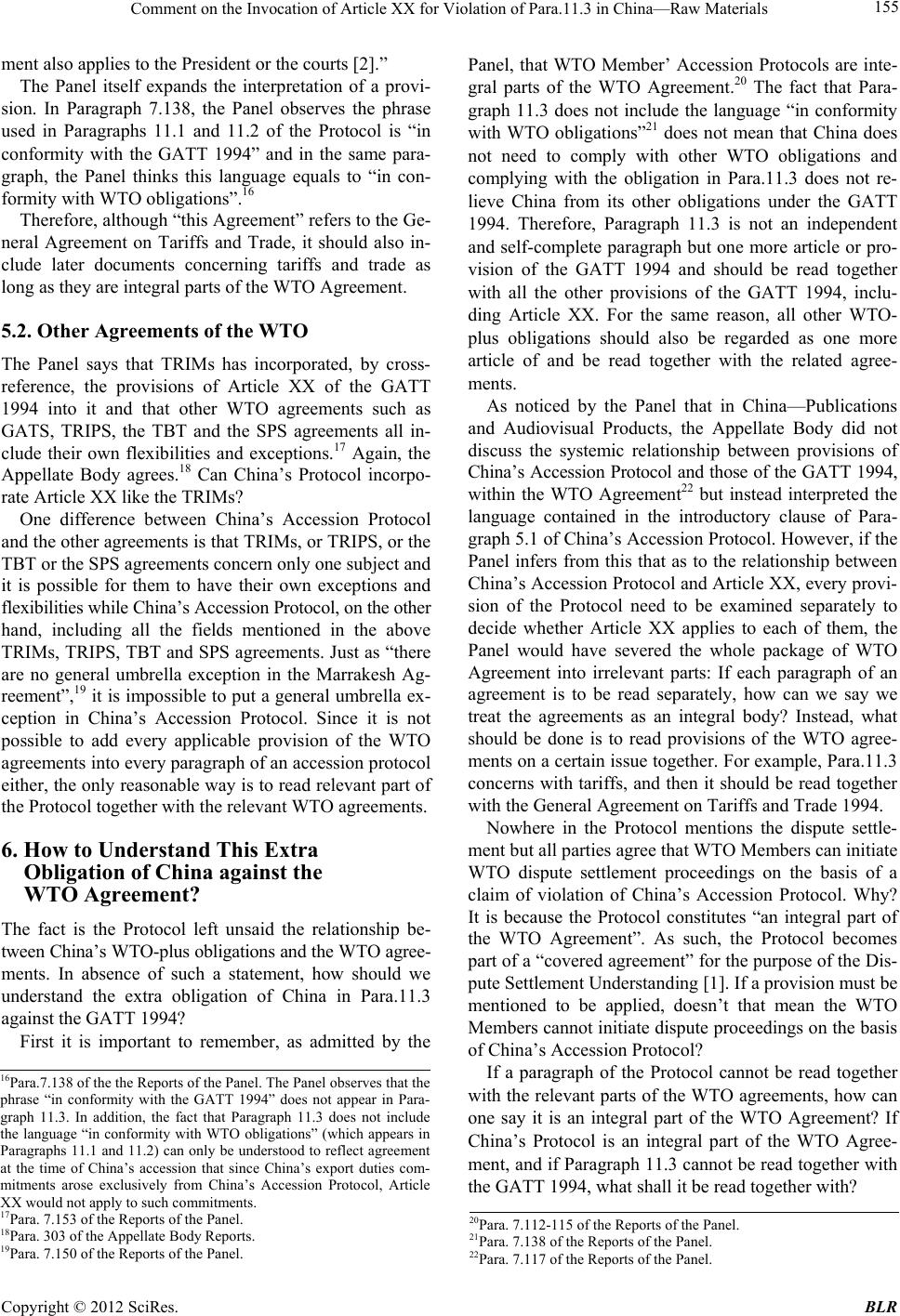 Comment on the Invocation of Article XX for Violation of Para.11.3 in China—Raw Materials 155 ment also applies to the President or the courts [2].” The Panel itself expands the interpretation of a provi- sion. In Paragraph 7.138, the Panel observes the phrase used in Paragraphs 11.1 and 11.2 of the Protocol is “in conformity with the GATT 1994” and in the same para- graph, the Panel thinks this language equals to “in con- formity with WTO obligations”.16 Therefore, although “this Agreement” refers to the Ge- neral Agreement on Tariffs and Trade, it should also in- clude later documents concerning tariffs and trade as long as they are integral parts of the WTO Agreement. 5.2. Other Agreements of the WTO The Panel says that TRIMs has incorporated, by cross- reference, the provisions of Article XX of the GATT 1994 into it and that other WTO agreements such as GATS, TRIPS, the TBT and the SPS agreements all in- clude their own flexibilities and exceptions.17 Again, the Appellate Body agrees.18 Can China’s Protocol incorpo- rate Article XX like the TRIMs? One difference between China’s Accession Protocol and the other agreements is that TRIMs, or TRIPS, or the TBT or the SPS agreements concern only one subject and it is possible for them to have their own exceptions and flexibilities while China’s Accession Prot ocol, on t he ot her hand, including all the fields mentioned in the above TRIMs, TRIPS, TBT and SPS agreements. Just as “there are no general umbrella exception in the Marrakesh Ag- reement”,19 it is impossible to put a general umbrella ex- ception in China’s Accession Protocol. Since it is not possible to add every applicable provision of the WTO agreements into every paragraph of an accession protocol either, the only reasonable way is to read relevant part of the Protocol together with the relevant WTO agreements. 6. How to Understand This Extra Obligation of China against the WTO Agreement? The fact is the Protocol left unsaid the relationship be- tween China’s WTO-plus obligations and the WTO agree- ments. In absence of such a statement, how should we understand the extra obligation of China in Para.11.3 against the GATT 1994? First it is important to remember, as admitted by the Panel, that WTO Member’ Accession Protocols are inte- gral parts of the WTO Agreement.20 The fact that Para- graph 11.3 does not include the language “in conformity with WTO obligations”21 does not mean that China does not need to comply with other WTO obligations and complying with the obligation in Para.11.3 does not re- lieve China from its other obligations under the GATT 1994. Therefore, Paragraph 11.3 is not an independent and self-complete paragraph but one more article or pro- vision of the GATT 1994 and should be read together with all the other provisions of the GATT 1994, inclu- ding Article XX. For the same reason, all other WTO- plus obligations should also be regarded as one more article of and be read together with the related agree- ments. As noticed by the Panel that in China—Publications and Audiovisual Products, the Appellate Body did not discuss the systemic relationship between provisions of China’s Accession Protocol and those of the GATT 1994, within the WTO Agreement22 but instead interpreted the language contained in the introductory clause of Para- graph 5.1 of China’s Accession Protocol. However, if the Panel infers from this that as to the relationship between China’s Accession Protocol and Article XX, every provi- sion of the Protocol need to be examined separately to decide whether Article XX applies to each of them, the Panel would have severed the whole package of WTO Agreement into irrelevant parts: If each paragraph of an agreement is to be read separately, how can we say we treat the agreements as an integral body? Instead, what should be done is to read provisions of the WTO agree- ments on a certain issue together. For example, Para.11.3 concerns with tariffs, and then it should be read together with the General Agreement on Tariffs and Trade 1994. Nowhere in the Protocol mentions the dispute settle- ment but all parties agree that WTO Members can initiate WTO dispute settlement proceedings on the basis of a claim of violation of China’s Accession Protocol. Why? It is because the Protocol constitutes “an integral part of the WTO Agreement”. As such, the Protocol becomes part of a “covered agreement” for the purpose of the Dis- pute Settlement Understanding [1]. If a provision must be mentioned to be applied, doesn’t that mean the WTO Members cannot initiate dispute proceedings o n the basis of China’s Accession Protocol? If a paragraph of the Protocol cannot be read together with the relevant parts of the WTO agreements, how can one say it is an integral part of the WTO Agreement? If China’s Protocol is an integral part of the WTO Agree- ment, and if Paragraph 11.3 cannot be read toge ther with the GATT 1994, what shall it be read together with? 16Para.7.138 of the the Reports of the Panel. The Panel observes that the p hrase “in conformity with the GATT 1994” does not appear in Para- graph 11.3. In addition, the fact that Paragraph 11.3 does not include the language “in conformity with WTO obligations” (which appears in Paragraphs 11.1 and 11.2) can only be understood to reflect agreement at the time of China’s accession that since China’s export duties com- mitments arose exclusively from China’s Accession Protocol, Article XX would not apply to such commitments. 17Para. 7.153 of the Reports of the Panel. 18Para. 303 of the Appellate Body Reports. 19Para. 7.150 of the Reports of the Panel. 20Para. 7.112-115 of the Reports of the Panel. 21Para. 7.138 of the Reports of the Panel. 22Para.7.117 of the Re p orts of the Panel. Copyright © 2012 SciRes. BLR 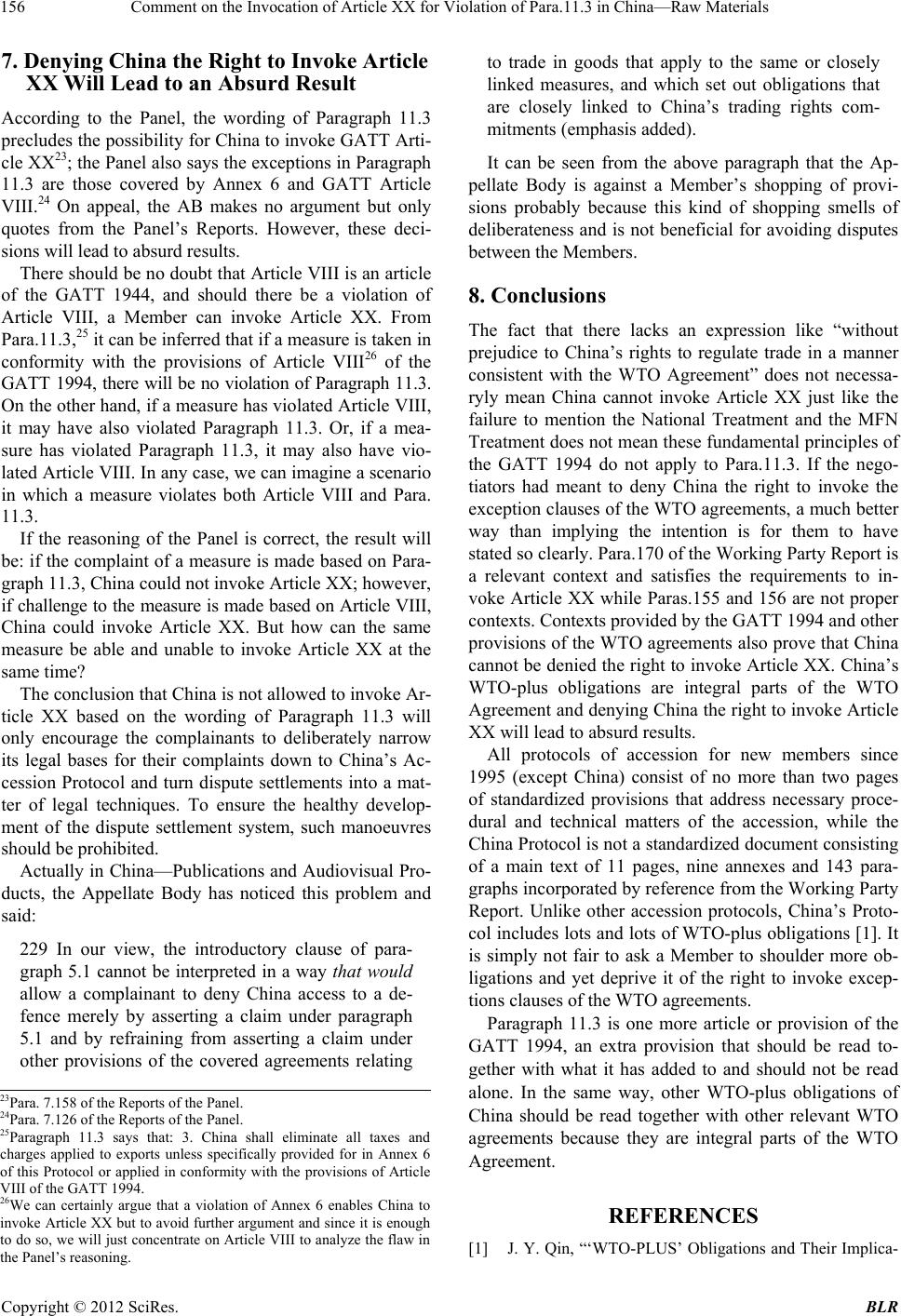 Comment on the Invocation of Article XX for Violation of Para.11.3 in China—Raw Materials 156 7. Denying China the Right to Invoke Article XX Will Lead to an Absurd Result According to the Panel, the wording of Paragraph 11.3 precludes the possibility for China to invoke GATT Arti- cle XX23; the Panel also says th e exceptions in Paragr aph 11.3 are those covered by Annex 6 and GATT Article VIII.24 On appeal, the AB makes no argument but only quotes from the Panel’s Reports. However, these deci- sions will lead to absurd results. There should be no doubt that Article VIII is an article of the GATT 1944, and should there be a violation of Article VIII, a Member can invoke Article XX. From Para.11.3,25 it can be inferred that if a measure is taken in conformity with the provisions of Article VIII26 of the GATT 1994, there will be no violation of Paragraph 11.3. On the other hand, if a measure has violated Article VIII, it may have also violated Paragraph 11.3. Or, if a mea- sure has violated Paragraph 11.3, it may also have vio- lated Article VIII. In any case, we can imagine a scenario in which a measure violates both Article VIII and Para. 11.3. If the reasoning of the Panel is correct, the result will be: if the complain t of a measure is made based on Para- graph 11.3, China could not invoke Article XX; however, if challenge to the measure is made based on Article VIII, China could invoke Article XX. But how can the same measure be able and unable to invoke Article XX at the same time? The conclusion that China is not allowed to invoke Ar- ticle XX based on the wording of Paragraph 11.3 will only encourage the complainants to deliberately narrow its legal bases for their complaints down to China’s Ac- cession Protocol and turn dispute settlements into a mat- ter of legal techniques. To ensure the healthy develop- ment of the dispute settlement system, such manoeuvres should be proh i bi t ed. Actually in China—Publication s and Audiovisua l Pro- ducts, the Appellate Body has noticed this problem and said: 229 In our view, the introductory clause of para- graph 5.1 cannot be interpreted in a way that would allow a complainant to deny China access to a de- fence merely by asserting a claim under paragraph 5.1 and by refraining from asserting a claim under other provisions of the covered agreements relating to trade in goods that apply to the same or closely linked measures, and which set out obligations that are closely linked to China’s trading rights com- mitments (emphasis added). It can be seen from the above paragraph that the Ap- pellate Body is against a Member’s shopping of provi- sions probably because this kind of shopping smells of deliberateness and is not beneficial for avoiding disputes between the Members. 8. Conclusions The fact that there lacks an expression like “without prejudice to China’s rights to regulate trade in a manner consistent with the WTO Agreement” does not necessa- ryly mean China cannot invoke Article XX just like the failure to mention the National Treatment and the MFN Treatment does not mean these fundamental principles of the GATT 1994 do not apply to Para.11.3. If the nego- tiators had meant to deny China the right to invoke the exception clauses of the WTO agreements, a much better way than implying the intention is for them to have stated so clearly. Para.170 of the Working Party Report is a relevant context and satisfies the requirements to in- voke Article XX while Paras.155 and 156 are not proper contexts. Contexts provided by the GATT 1994 and other provisions of the WTO agreements also prove that China cannot be denied the right to invoke Article XX. China’s WTO-plus obligations are integral parts of the WTO Agreement and denying China the right to invoke Article XX will lead to absurd results. All protocols of accession for new members since 1995 (except China) consist of no more than two pages of standardized provisions that address necessary proce- dural and technical matters of the accession, while the China Protocol is not a standardized document consisting of a main text of 11 pages, nine annexes and 143 para- graphs incorporated by reference from the Working Party Report. Unlike other accession protocols, China’s Proto- col includes lots and lots of WTO-plu s obligations [1]. It is simply not fair to ask a Member to shoulder more ob- ligations and yet deprive it of the right to invoke excep- tions clauses of the WTO agreements. Paragraph 11.3 is one more article or provision of the GATT 1994, an extra provision that should be read to- gether with what it has added to and should not be read alone. In the same way, other WTO-plus obligations of China should be read together with other relevant WTO agreements because they are integral parts of the WTO Agreement. 23Para. 7.158 of the Reports of the Panel. 24Para. 7.126 of the Reports of the Panel. 25Paragraph 11.3 says that: 3. China shall eliminate all taxes and charges applied to exports unless specifically provided for in Annex 6 of this Protocol or applied in conformity with the provisions of Article VIII of the GATT 1994. 26We can certainly argue that a violation of Annex 6 enables China to invoke Article XX but to avoid further argument and since it is enough to do so, we will just concentrate on Article VIII to analyze the flaw in the Panel’s reasoning. REFERENCES [1] J. Y. Qin, “‘WTO-PLUS’ Obligations and Their Implica- Copyright © 2012 SciRes. BLR 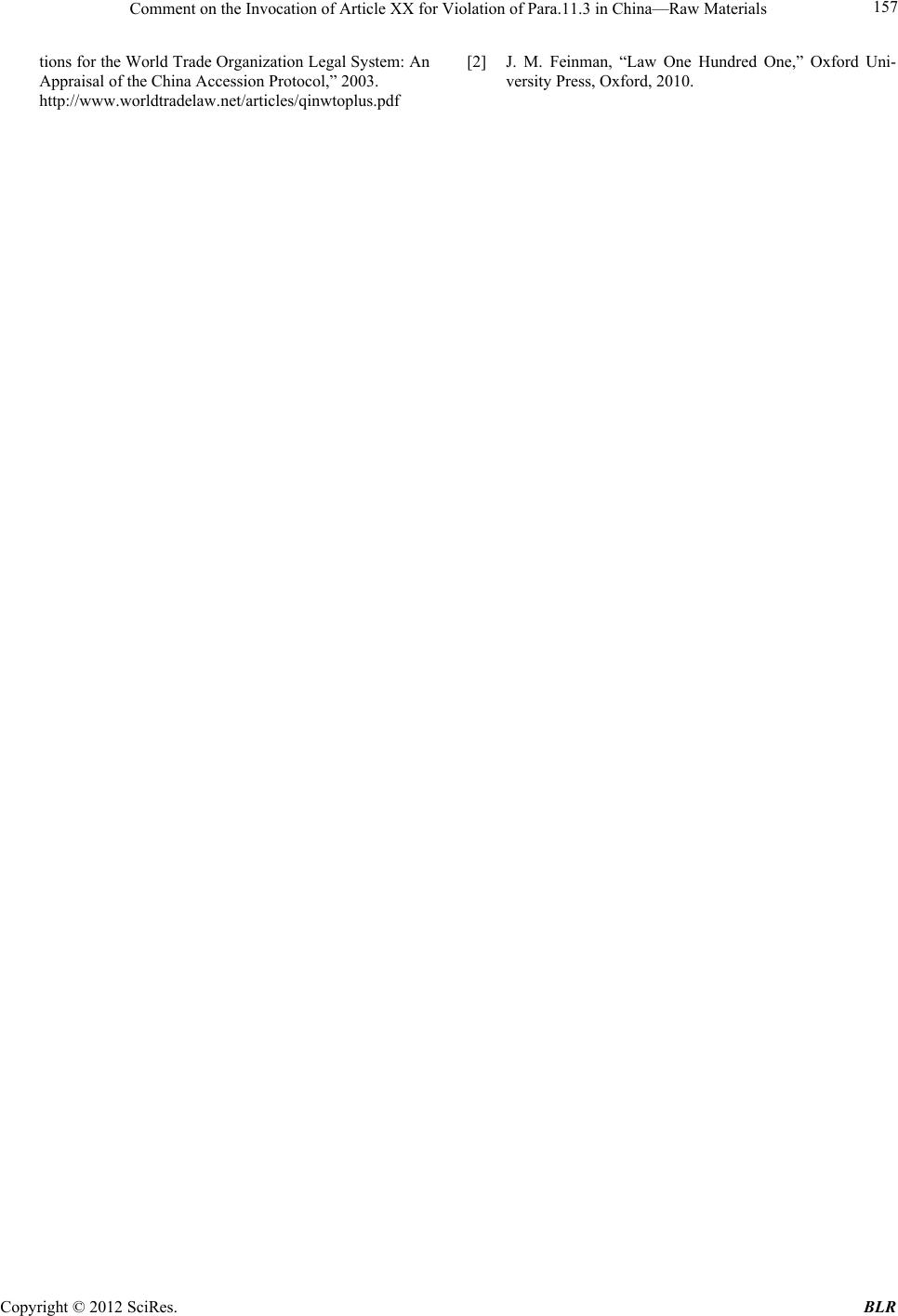 Comment on the Invocation of Article XX for Violation of Para.11.3 in China—Raw Materials Copyright © 2012 SciRes. BLR 157 tions for the World Trade Organization Legal System: An Appraisal of the China Accession Protocol,” 2003. http://www.worldtradelaw.net/articles/qinwtoplus.pdf [2] J. M. Feinman, “Law One Hundred One,” Oxford Uni- versity Press, Oxford, 2010. |

